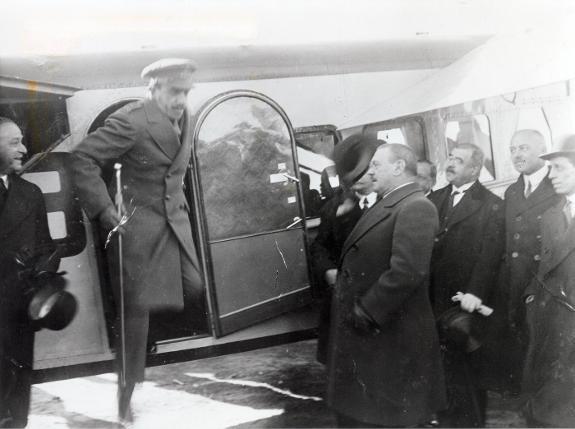

Sections
Highlight

Tony Bryant
Friday, 14 December 2018, 14:04
Compartir
The launch of the airline Iberia's first commercial flight from Madrid to Barcelona on 14 December 1927 was Spain's first foray into commercial aviation. Iberia Líneas Aéreas de España, S. A. was founded in June 1927 by Horacio Echevarrieta, a Basque businessman and politician; and Deutsche Luft Hansa (DLH), a German airline serving as flag carrier during the final years of the Weimar Republic. The majority share of the company was held by Echevarrieta, who became chairman of the board, but German support was crucial, because in addition to investing 24 per cent of the capital, DLH contributed materials and technical support.
Iberia's objective was to provide peninsular and transatlantic air services and it immediately applied for concession to establish regular flights between Madrid and Barcelona.
Founded during the dictatorship of Primo de Rivera, with a capital of 1.1 million pesetas, its first commercial flight took off from the airport in Carabanchel (current Cuatro Vientos Airport) and landed in Barcelona three hours later.
The official flight on the ten-seater Rohrbach Roland monoplane included among its passengers the Spanish king, Alfonso XIII.
Prior to the official flight, a plane first flew from Barcelona to Madrid so that the king could witness the first landing. However, extreme weather issues forced the aircraft to arrive much later than expected.
The three-hour trip became a daily service that operated in both directions, and within a year of its first flight, the company was sponsored by the Spanish government to provide postal transport between Madrid and Barcelona.
By 1928, Iberia had three Rohrbach Ro VIII Roland aircraft, all with a capacity for ten passengers.
During the dictatorship of Primo de Rivera, the aviation companies in Spain were state-controlled and as a consequence, in 1929, Iberia, along with Unión Aérea Española, was merged into Compañía de Líneas Aéreas Subvencionadas S.A. (CLASSA) and the new enterprise was granted a monopoly. CLASSA, which initially ran flights between Madrid and Seville, began regular operations in May of that year. Though Iberia as an independent entity disappeared from the air transport scene until 1937, the airline maintained its registration in the Companies Register of Madrid.
At the end of the Civil War, with Barajas Airport in Madrid as its base, Iberia began operating flights between Madrid and Barcelona, Burgos, Seville, and Valencia, as well as Lisbon, in Portugal.
Nationalised in 1940 when its debt to DLH was paid off, Iberia was granted a monopoly over regular domestic flights and to colonies and protected territories.
Today, Iberia operates an international network of services. The Iberia Group flies to over 109 destinations in 39 countries, and a further 90 destinations through code-sharing agreements with other airlines.
In 2010, British Airways and Iberia merged, making the combined operation the third largest commercial airline in the world. The newly merged company, known as International Airlines Group (IAG), was established in January 2011, although both airlines continue to operate under their own brand.
Publicidad
Publicidad
Publicidad
Publicidad
Reporta un error en esta noticia
Necesitas ser suscriptor para poder votar.